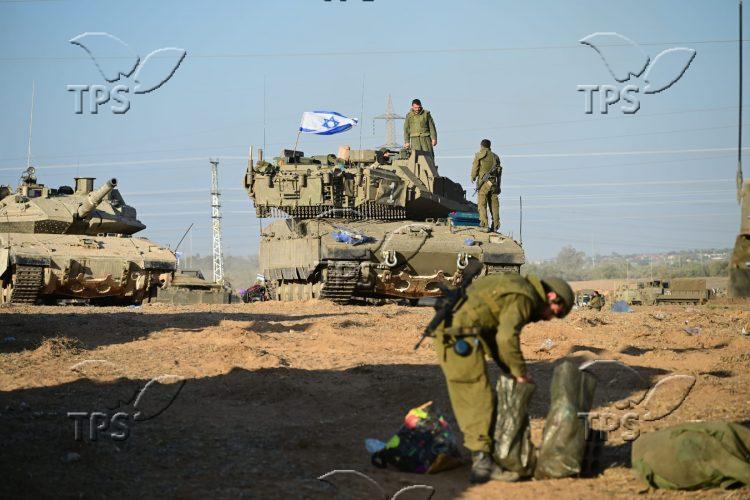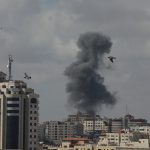What Will the Gaza Ground War Look Like?
Jerusalem, 13 October, 2023 (TPS-IL) -- A widely-expected Israeli ground invasion of Gaza appears imminent as the Israel Defense Forces told one million Palestinians living in the northern Gaza Strip to evacuate their homes on Friday. Meanwhile, the Home Front Command the Chief Rabbinate issued instructions to citizens on precautions for the upcoming Sabbath.
Israel Defense Forces Spokesman Rear Adm. Daniel Hagari told reporters that the evacuation order was meant to limit Palestinian civilian casualties, while Hamas instructed Gazans to ignore the warnings, describing them as “psychological warfare.”
Israelis were told to leave a radio on during the Sabbath in order to receive further instructions and warnings in the event of an emergency. Israelis with gun permit were instructed to carry their firearms, even if they wouldn’t ordinarily do so during the Sabbath. Many synagogues sent WhatsApp messages notifying congregants of changes in prayer times and locations.
‘Going Through Every Square Meter’
“There will be an initial push inside Gaza to cut Gaza into different slices. This is going to be very quick, and this will be the first phase,” Professor Eitan Shamir predicted to the Tazpit Press Service as Israelis and Palestinians braced for an uncertain weekend. Shamir lectures on political science at Bar-Ilan University and is the director of its Begin-Sadat Center for Strategic Studies.
From there, the operation becomes more complex, Shamir explained.
The second phase, what Shamir called “clearing the ground,” means “going through every square meter, finding whether there’s terrorists above the ground or under the ground,” he said.
“The big challenge is under the ground because you have this whole ‘metro’ system Hamas has underground. We know how to locate tunnels today, and they will be located.” Shamir added that he hopes the tunnels can be neutralized without having to send soldiers inside.
“There is the question that some of the hostages are being held in the tunnels, so there will be a dilemma here,” Shamir stressed.
Asked how the IDF can balance out its fight with Hamas without harming the more than 100 Israeli hostages being held in Gaza, Shamir said, “I don’t think that’s possible,” explaining that the presence of hostages can’t be allowed to paralyze the overall military operation.
This war will be different than previous ground wars because its overall goal is to root out Hamas, not to simply re-establish deterrence or buy a few years of calm, Shamir stressed.
“This is an operation that says we’re not going to suffer your existence anymore. This is a different kind of operation with more risks than when you ‘mow the grass.’ Mowing the grass is that you kill a lot of terrorists and do enough damage so you buy yourself a few years of quiet.”
‘Urban Combat Favors the Defender’
The arena — the densely populated Gaza Strip — raises other challenges for the IDF.
“”Urban warfare is very hard. It favors the defender. We’re evacuating the civilians and the army will make every attempt not to harm civilians,” Shamir stressed. “But the rules of proportionality is that if someone is shooting at you from a building, you can blow up the building. There is a point where you cannot be paralyzed by it, because otherwise, your hands are tied.”
Shamir also noted that Hamas has weapons storage sites, command and control centers, launchers and tunnel shafts in close proximity to homes, schools, hospitals, mosques and other civilian locations.
“There are no Hamas targets that aren’t in civilian areas, let’s be clear. The Hamas headquarters are under the Shifa Hospital. You can’t bomb the hospital, so you have to go in with troops and take over the hospital. But that’s going to be messy as well.”
Shamir stressed — again — “you cannot let this paralyze you.”
“When the IDF was fighting in Kibbutz Be’eri, there were tanks there and as much as possible, they made every effort not to harm our civilians. But civilians were caught in the crossfire and to say they won’t be killed by IDF bullets is impossible,” he noted.
Asked about his biggest concerns, Shamir said, “One is that there’s another front with Hezbollah or maybe Iran. The other is that maybe the international community will force Israel to stop its operation before it completes its objectives.”
He added that some Israeli officials are considering an exit strategy, but the primary focus is on the military operation.
“It will be up to the international community to come up with some arrangement there. And Israel will be part of it to make sure that Gaza isn’t taken hostage again by radical terror organizations. What will happen in terms of who controls it, whether it’s Egypt, the international community or the Palestinian Authority, we’ll see.”
More than 1,300 Israelis were killed in assaults on Gaza-area communities and rocket fire.
“This is a 9/11 moment for Israel. I would say 9/11 ten times more. In the end, the US has to cope with an enemy far away from its borders. The terrorists came to the US, but their bases were far away. Here, these people are on our border and that makes it very different.”







